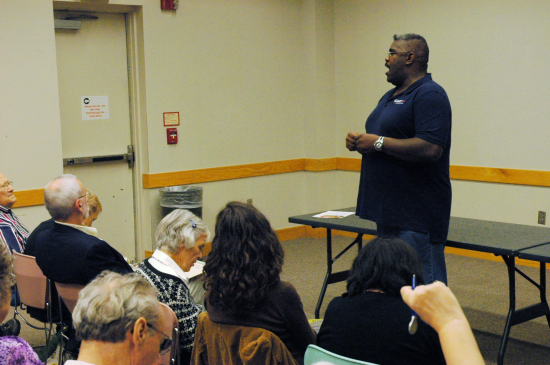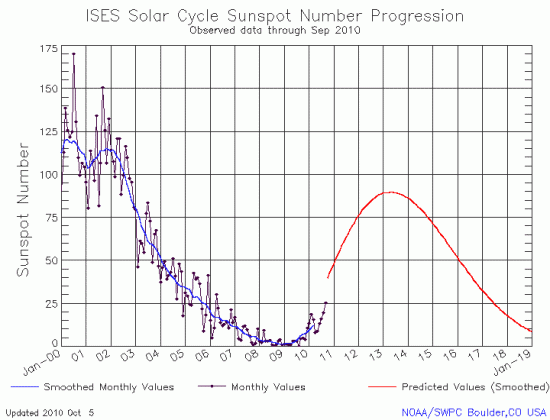Month: October 2010
The Sci-Fi Airshow
Chile miners should be reached ‘within hours’
The shaft to rescue the trapped Chilean miners should reach them ‘within hours’, according to this BBC report.
The shaft to rescue the trapped Chilean miners should reach them ‘within hours’, according to this BBC report.
Asteroids of note
At today’s press conference at the 42nd meeting of the AAS Division for Planetary Sciences, the topic was asteroids, including one which holds the possibility of hitting the Earth.
- 65 Cybele has been found to have water ice and organic molecules on its surface, the second such asteroid so found. Key quote from the abstract:
We conclude that 65 Cybele is covered by fine anhydrous silicate grains, with a small amount of water-ice and complex organic solids. This is similar to comets where non-equilibrium phases coexist, e.g. water-ice and anhydrous silicates; thus we conclude that this is a very primitive object.
According to Humberto Campins of the University of Central Florida, this combination of water and organics could become hospitable to life should some form of energy be added, such as an impact to the asteroid.
- The origin of the asteroid Phaethon, cause of the Geminids meteor shower, has been traced to the Pallas family of asteroids, a family created by the debris thrown out during a crater impact on the large asteroid Pallas. Campins also noted that this proves Phaethon is an asteroid and not a comet, a question that astronomers had been debating beforehand. Read the abstract here.
- Asteroid 1999 RQ36, which has a 1 in a 1000 chance hitting the Earth in 2182 and is also the prime target of a proposed NASA sample return mission, has now been determined to be a member of the Polana family of asteroids. This makes 1999 RQ36 a very primitive asteroid from the very beginnings of the solar system. Moreover, this suggests that the Polana family could be the “most important” source of many near Earth asteroids. The abstract can be found here.
Preliminary rescue date for Chilean miners set
This graphic summarizes the effort underway to rescue the 33 trapped Chilean miners, including noting the October 10 target rescue date.
This graphic summarizes the effort underway to rescue the 33 trapped Chilean miners, including noting the October 10 target rescue date.
Saudis arrest Filipino Catholics for practicing their Catholic religion
Islamic tolerance on parade! A dozen Filipino Catholics and their priest were arrested by Saudi police last week, simply for gathering to practice their Catholic religion. More from Robert Spencer.
Islamic tolerance on parade! A dozen Filipino Catholics and their priest were arrested by Saudi police last week, simply for gathering to practice their Catholic religion. More from Robert Spencer.
A Tea Party in Maryland
Last night I attended the most recent meeting of the Maryland Society of Patriots, a tea party group that was founded back in 2009. Attendance was pretty typical, with about fifty people filling the meeting room of the local library in Burtonsville, Maryland. As usual, Sam Hale, the founder of the group, had garnered a range of candidates to speak to us, including Eric Wargotz, the Republican candidate for the Senator, running against Barbara Mikulski (D-Maryland).

For Wargotz, the questions got a bit heated at one point, as one member of the audience wanted to know his commitment to defending the Constitution.
What makes this group significant is that the majority of its members come from very Democratic districts. Yet, not only has attendance been high at almost every meeting, the membership has including a wide range of ordinary people, most of whom have never done politicial activitism in their lives.

This is Eric Cary, who is running for the Maryland State Senate. I’ve included more pictures below the fold. » Read more
Dingel trails in Detroit
Holy mackerel! John Dingell (D-Michigan) trails GOP challenger by four points in Detroit. This in a city that has voted Democrat from 93% to 96% in the last three general elections.
Holy mackerel! John Dingell (D-Michigan) trails GOP challenger by four points in Detroit. This in a city that has voted Democrat from 93% to 96% in the last three general elections.
Global hurricane activity at 33-year low
Didn’t Al Gore tell us that we were going to get more big storms? The global hurricane activity is at 33-year low.
Didn’t Al Gore tell us that we were going to get more big storms? The global hurricane activity is at 33-year low.
JPL scientists demand correction of White House statements before Supreme Court
JPL scientists demand correction of White House statements before Supreme Court over privacy suit.
JPL scientists demand correction of White House statements before Supreme Court over privacy suit.
Federal government spending rose 9% in 2010
So, Congressman Hare (D-Illinois), is the debt still a myth? According to numbers released today by the Congressional Budget Office, the federal government’s spending rose 9% in 2010, for a total deficit of $1.291 trillion.
So, Congressman Hare (D-Illinois), is the debt still a myth? According to numbers released today by the Congressional Budget Office, the federal government’s spending rose 9% in 2010, for a total deficit of $1.291 trillion.
Soyuz launches with three astronauts, headed to ISS
A Soyuz rocket launched a new crew of three astronauts to ISS today. Fun quote:
The six [astronauts on ISS] on Nov. 1 will celebrate the 10th anniversary of continuous human presence on the station.
A Soyuz rocket launched a new crew of three astronauts to ISS today. Fun quote:
The six [astronauts on ISS] on Nov. 1 will celebrate the 10th anniversary of continuous human presence on the station.
Kate and Anna McGarrigle: Heart like a wheel
An evening pause: A belated memorial to Kate McGarrigle, who passed away from cancer on January 18, 2010. Here she and her sister Anna sing their classic, “Heart like a Wheel”, Cafe Lena 1990.
The basic ingredients of life might exist in Titan’s atmosphere
Big news! In a simulation of the upper atmosphere of Titan at about 600 miles altitude, scientists have discovered the basic ingredients of life are quickly synthesized when exposed to the kind of hard radiation found there. Key quote from the press release, issued today at the 42nd meeting of the AAS Division for Planetary Sciences:
The molecules discovered include the five nucleotide bases used by life on Earth (cytosine, adenine, thymine, guanine and uracil) and the two smallest amino acids, glycine and alanine.
For those who don’t remember their high school biology, these nucleotides are the building blocks of DNA.
The abstract of the scientist’s work can be found here.
What the scientists did was recreate the basic ingredients of Titan’s upper atmosphere, comprised of nitrogen, methane and carbon monoxide. Cassini data has shown that within this atmosphere are very large molecules, as yet unidentified.
The scientists then bathed their recreation in the kind of intense radiation expected at that altitude, and amazingly produced the complex organic molecules that are basic to life. Moreover, the experiment was the first to produce these complex molecules without the presence of water, something that scientists have previously thought was required. These results suggest that in addition to forming in the oceans, life could also form in the upper atmospheres of planets.
This result also suggests strongly that it is incredibly easy to produce the basic building blocks of life, almost anywhere in the universe where organic molecules are present.
White House arbitrarily gives healthcare law waivers to some companies
The law for some but not for others: Threatened with a firestorm of protest just prior to the election because a number of large corporations were going to drop millions from healthcare coverage because of the new Obamacare regulations, the White House today arbitrarily waived for one year those provisions for 30 large companies.
This action raises three obvious points:
- If the healthcare law was so wonderful, why is the White House suspending its inception?
- Why should these companies get a break, and not others? In fact, if I was the owner of a company that did not get a waiver, I would sue.
- This once again proves false the claim by Obama that the law would force no one to lose their healthcare plan. To me, the words “You lie!” come quickly to mind.
Ed Morrissey at hotair.com makes some additional good points about this absurd situation.
ESA struggles to fund returnable module
Government space faces budget realities: The European Space Agency is struggling to find the funds to both extend ISS as well as upgrade their cargo carrier so that it can also return cargo from ISS.
Government space faces budget realities: The European Space Agency is struggling to find the funds to both extend ISS as well as upgrade their cargo carrier so that it can also return cargo from ISS.
Bigelow about to announce big news
Private space moves forward, without NASA: Clark Lindsey at www.rlvnews.com notes that Robert Bigelow — the man behind the first private space station’s — seems poised to announce the first six nations who’ve agreed to rent space on his stations.
Private space moves forward, without NASA: Clark Lindsey at www.rlvnews.com notes that Robert Bigelow — the man behind the first private space station’s — seems poised to announce the first six nations who’ve agreed to rent space on his stations.
Bolden’s trip his idea, not the White House’s
According to the website SpaceRef, NASA administrator Charles Bolden’s trip to Saudia Arabia and China this past week was his idea alone, and that the White House did not want him to go.
According to the website SpaceRef, NASA administrator Charles Bolden’s trip to Saudia Arabia and China this past week was his idea alone, and that the White House did not want him to go.
The Sun was brighter when it was dimmer?
The science is settled? According to one scientist’s data, the Sun actually brightened in visible wavelengths during the ramp down from solar maximum to minimum in 2004-2007 — the exact opposite to what was expected — while dropping in the ultraviolet four times more than predicted.
The science is settled? According to one scientist’s data, the Sun actually brightened in visible wavelengths during the ramp down from solar maximum to minimum in 2004-2007 — the exact opposite to what was expected — while dropping in the ultraviolet four times more than predicted.
Scientists and Soldiers Solve a Bee Mystery
The cause of the mysterious honey bee die-off since 2006 appears to have been identified.
The cause of the mysterious honey bee die-off since 2006 appears to have been identified.
Layoffs Continue as NASA Slows Constellation Spending
Confusion at NASA: Layoffs continue as NASA slows Constellation spending. This despite a budget in 2010 that requires the program’s continuation, and a Congressional authorization for 2011 that requires NASA to build a comparable heavy-lift rocket.
Confusion at NASA: Layoffs continue as NASA slows Constellation spending. This despite a budget in 2010 that requires the program’s continuation, and a Congressional authorization for 2011 that requires NASA to build a comparable heavy-lift rocket.
Chang’e 2 arrives in lunar orbit
China’s new lunar orbiter, Chang’e 2, has arrived in lunar orbit.
China’s new lunar orbiter, Chang’e 2, has arrived in lunar orbit.
Apollo 11 original television footage unveiled
Digitally remastered footage of the original television recordings from the Apollo 11 mission have been unveiled in Australia.
Digitally remastered footage of the original television recordings from the Apollo 11 mission have been unveiled in Australia.
It’s only a seltzer moon
Plumes from Saturn’s Enceladus may be carbonated
The plumes that come out of the tiger stripe cracks on Saturn’s moon Enceladus may be carbonated!
The plumes that come out of the tiger stripe cracks on Saturn’s moon Enceladus may be carbonated!
Engineer spice
Pluto’s ice: 97% nitrogen, 3% methane
More results from the press conference going on right now at the 42nd meeting of the AAS Division for Planetary Sciences:
Pluto’s surface ice is made up of 97% nitrogen, 3% methane, while the surface of the Kuiper Belt object Eris (which is larger than Pluto) is even more rich in methane, with a make up of 90% nitrogen and 10% methane. Both measurements go down to a depth of about 10 inches. To see the abstract for this result, go here.
More results from the press conference going on right now at the 42nd meeting of the AAS Division for Planetary Sciences:
Pluto’s surface ice is made up of 97% nitrogen, 3% methane, while the surface of the Kuiper Belt object Eris (which is larger than Pluto) is even more rich in methane, with a make up of 90% nitrogen and 10% methane. Both measurements go down to a depth of about 10 inches. To see the abstract for this result, go here.
The atmosphere of Venus is 60% less dense at its poles
By diving into the upper atmosphere of Venus above its north pole, Venus Express has found that the atmosphere there is 60% less dense than predicted. This from a press conference going on right now at the 42nd meeting of the AAS Division for Planetary Sciences. They plan an additional dive campaign during the next month. And they plan more dives, going deeper each time, as they judge the consequences to the spacecraft each time.
To read the abstracts of the Venus Express papers, go here.
Updated: The full press release, with images, can be seen here.
By diving into the upper atmosphere of Venus above its north pole, Venus Express has found that the atmosphere there is 60% less dense than predicted. This from a press conference going on right now at the 42nd meeting of the AAS Division for Planetary Sciences. They plan an additional dive campaign during the next month. And they plan more dives, going deeper each time, as they judge the consequences to the spacecraft each time.
To read the abstracts of the Venus Express papers, go here.
Updated: The full press release, with images, can be seen here.
No active volcanoes on Mars
From a session today at the 42nd meeting of the AAS Division for Planetary Sciences: After thirteen years of searching, scientists have concluded that Mars has no active volcanic activity, including geysers, anywhere on its surface.
From a session today at the 42nd meeting of the AAS Division for Planetary Sciences: After thirteen years of searching, scientists have concluded that Mars has no active volcanic activity, including geysers, anywhere on its surface.
Geert Wilder’s words make Muslims uncomfortable
How sad. The harsh words that Dutch politician Geert Wilder has for Islam (now facing prison for saying those words) is making Muslims in the Netherlands feel unsafe. Key quote:
“My family and I no longer feel safe in the Netherlands because Mr. Wilders is continually making hateful remarks about Islamic Dutch people,” said one complaint read out by the judge.
Gee. What about the more than 16,000 violent attacks committed by Islamic terrorists since September 11, 2001, leaving tens of thousands of people dead or maimed? How does this violence make these Dutch Muslims feel?
The October 2010 sunspot graph
Yesterday NOAA’s Space Weather Prediction Center published its October monthly graph, showing the sun’s developing sunspot cycle in comparison with the consensis prediction made by the solar science community in May 2009.

Sunspot activity in September clearly jumped, though it still remains far below predictions. Prepare for the weakest solar maximum since the 1810s!
Note also that today the Sun is blank, with no sunspots, the first time this has happened since August. At that time I speculated that this might “be the last time the Sun will be blank for years as it continues to ramp up to its next solar maximum.” Obviously not. The question now is whether today will be the finale in blankness for this minimum.
